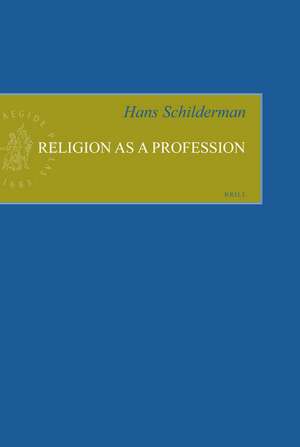Religion as a Profession: Empirical Studies in Theology, cartea 12
Autor Hans Schildermanen Limba Engleză Hardback – 14 iul 2005
Din seria Empirical Studies in Theology
- 18%
 Preț: 682.23 lei
Preț: 682.23 lei - 65%
 Preț: 644.30 lei
Preț: 644.30 lei - 18%
 Preț: 735.79 lei
Preț: 735.79 lei - 18%
 Preț: 673.11 lei
Preț: 673.11 lei - 18%
 Preț: 684.09 lei
Preț: 684.09 lei - 18%
 Preț: 684.18 lei
Preț: 684.18 lei - 18%
 Preț: 645.92 lei
Preț: 645.92 lei - 18%
 Preț: 794.48 lei
Preț: 794.48 lei - 18%
 Preț: 732.41 lei
Preț: 732.41 lei - 18%
 Preț: 681.29 lei
Preț: 681.29 lei - 18%
 Preț: 1065.89 lei
Preț: 1065.89 lei - 18%
 Preț: 636.95 lei
Preț: 636.95 lei - 18%
 Preț: 680.35 lei
Preț: 680.35 lei - 18%
 Preț: 643.77 lei
Preț: 643.77 lei - 15%
 Preț: 447.72 lei
Preț: 447.72 lei - 15%
 Preț: 448.69 lei
Preț: 448.69 lei - 18%
 Preț: 644.92 lei
Preț: 644.92 lei - 18%
 Preț: 643.15 lei
Preț: 643.15 lei - 18%
 Preț: 736.00 lei
Preț: 736.00 lei
Preț: 736.85 lei
Preț vechi: 898.60 lei
-18% Nou
Puncte Express: 1105
Preț estimativ în valută:
141.04€ • 153.25$ • 118.55£
141.04€ • 153.25$ • 118.55£
Carte indisponibilă temporar
Doresc să fiu notificat când acest titlu va fi disponibil:
Se trimite...
Preluare comenzi: 021 569.72.76
Specificații
ISBN-13: 9789004144521
ISBN-10: 9004144528
Pagini: 428
Dimensiuni: 171 x 243 x 32 mm
Greutate: 0.92 kg
Editura: Brill
Colecția Brill
Seria Empirical Studies in Theology
ISBN-10: 9004144528
Pagini: 428
Dimensiuni: 171 x 243 x 32 mm
Greutate: 0.92 kg
Editura: Brill
Colecția Brill
Seria Empirical Studies in Theology
Public țintă
All those intested in professionalisation theory, in social sciences, religious studies and theology, and involved in academic education, formation and training of religious specialists: both masterstudents and professors, trainers and supervisors.Cuprins
List of Figures ... xi
Acknowledgments ... xiii
Introduction ... 1
Chapter One Design
1.1 Research problem ... 13
1.1.1 Professionalisation and theology of ministry ... 13
1.1.2 Pastoral theology of ministry ... 21
1.1.3 Clarification of concepts ... 24
1.1.4 Aim ... 30
1.1.5 Research questions ... 33
1.2 Research design ... 35
1.2.1 Research procedure ... 35
1.2.2 Sampling ... 37
1.3 Research population ... 38
1.3.1 Characteristics of pastors ... 38
1.3.2 Religious characteristics ... 40
1.3.3 Professional characteristics ... 42
1.3.4 Work situation characteristics ... 46
1.3.5 Social location of the professional association ... 49
1.4 Structure of the book ... 50
1.5 Summary ... 52
Chapter Two Professionalisation
2.1 Work ... 53
2.1.1 Characteristics of work ... 54
2.1.2 Division of labour ... 57
2.1.3 Quality of work ... 60
2.1.4 Occupations and work ... 62
2.2 Professionalisation ... 67
2.2.1 Theories of professionalisation ... 67
2.2.2 Choice of a power theory of professionalisation ... 70
2.2.3 Premises of professionalisation ... 74
2.3 Goals of professionalisation ... 82
2.3.1 Professionalisation objectives ... 83
2.3.2 Attitudes towards professionalisation objectives ... 85
2.3.3 Social location of attitudes towards professionalisation objectives ... 88
2.4 Themes of professionalisation ... 92
2.4.1 Professionalisation themes ... 92
2.4.2 Attitudes towards professionalisation themes ... 93
2.4.3 Social location of attitudes towards professionalisation themes ... 96
2.5 Assigning responsibility for professionalisation ... 99
2.5.1 Assigning professionalisation responsibility ... 99
2.5.2 Attitudes towards assigning responsibility for professionalisation ... 100
2.5.3 Social location of attitudes towards assignment of professionalisation responsibility ... 104
2.6 Summary ... 107
Chapter Three Theology of Ministry
3.1 Ministry ... 108
3.1.1 Work, profession and office ... 108
3.1.2 Theology of ministry ... 113
3.2 The church ... 122
3.2.1 Authority ... 122
3.2.2 Apostolicity ... 131
3.2.3 Parochial leadership ... 140
3.3 Sacraments ... 149
3.3.1 Sacramental efficacy ... 150
3.3.2 Accession to the office ... 159
3.4 Spirituality ... 175
3.4.1 Role of spirituality ... 175
3.4.2 Sources of spirituality ... 182
3.4.3 Spiritual images of the office ... 190
3.5 Attitudes towards the office ... 199
3.5.1 Aspects of theology of ministry ... 199
3.5.2 Attitudes towards the office ... 201
3.5.3 Holders of attitudes towards the office ... 205
3.6 Summary ... 211
Chapter Four Theology of Ministry and Professionalisation
4.1 Theological support for professionalisation ... 214
4.2 Theology of ministry and goals for professionalisation ... 217
4.2.1 Theological support for professionalisation goals in the occupational group ... 217
4.2.2 Theological support for professionalisation goals in sub-groups ... 220
4.3 Theology of ministry and professionalisation themes ... 223
4.3.1 Theological support for professionalisation themes in the occupational group ... 223
4.3.2 Theological support for professionalisation themes in sub-groups ... 226
4.4 Theology of ministry and responsible institutions ... 229
4.4.1 Theological support for different responsible institutions in the occupational group ... 229
4.4.2 Theological support for responsible institutions in sub-groups ... 231
4.5 Theological legitimation of professionalisation ... 235
4.5.1 Legitimation ... 235
4.5.2 Legitimation problems of pastoral work ... 238
4.5.3 Theological legitimation of professionalisation by pastors ... 243
4.6 Summary ... 258
Chapter Five Theological Evaluation of Professionalisation
5.1 Theological legitimacy of professionalisation ... 260
5.1.1 Theological premises of professionalisation ... 261
5.1.2 Morality of power and work in the church ... 267
5.1.3 Morality of pastoral professionalisation ... 274
5.2 Summary ... 278
Appendixes ... 279
1 Items ... 279
2 Sample ... 303
3 Scale overview ... 305
4 Tables ... 310
Bibliography ... 415
Index ... 425
Notă biografică
Hans (J.B.A.M.) Schilderman, Ph.D. (1998) in Theology, Catholic University of Nijmegen, is Associate Professor in Empirical Theology at the Radboud University in Nijmegen. He has published on issues of empirical research in theology and on professionalisation topics in institutionalized religion.
